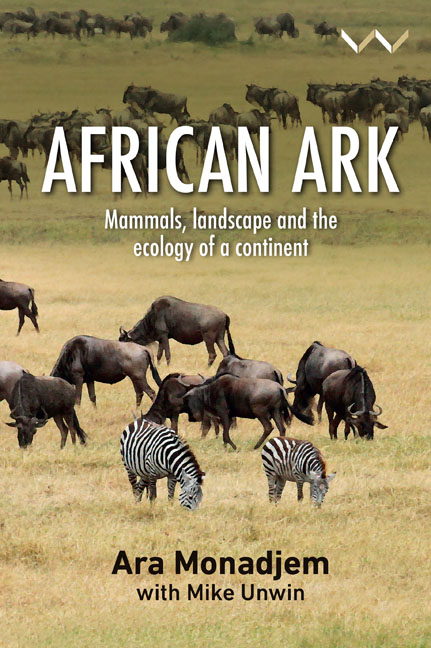Book contents
- Frontmatter
- Dedication
- Contents
- List of Plate Photographs
- List of Figures and Tables
- Acknowledgements
- Foreword
- Preface
- Chapter 1 A Continent of Plenty
- Chapter 2 The Species Conundrum
- Chapter 3 The History of Africa’s Mammals
- Chapter 4 Islands as Species Factories
- Chapter 5 Evolution on the African Mainland
- Chapter 6 Giant Mammals Shaping the Landscape
- Chapter 7 A Place for Every Species
- Chapter 8 Fluctuating Populations
- Chapter 9 The Human Factor
- Chapter 10 The Sinking Ark?
- Glossary
- Notes
- References
- Recommended Reading
- Index
Chapter 10 - The Sinking Ark?
Published online by Cambridge University Press: 29 November 2023
- Frontmatter
- Dedication
- Contents
- List of Plate Photographs
- List of Figures and Tables
- Acknowledgements
- Foreword
- Preface
- Chapter 1 A Continent of Plenty
- Chapter 2 The Species Conundrum
- Chapter 3 The History of Africa’s Mammals
- Chapter 4 Islands as Species Factories
- Chapter 5 Evolution on the African Mainland
- Chapter 6 Giant Mammals Shaping the Landscape
- Chapter 7 A Place for Every Species
- Chapter 8 Fluctuating Populations
- Chapter 9 The Human Factor
- Chapter 10 The Sinking Ark?
- Glossary
- Notes
- References
- Recommended Reading
- Index
Summary
This chapter was the most difficult for me to write, with many draft versions consigned to the trash before I finally settled on what you’re about to read. As you might imagine, the topic is a highly charged one for any lover of the natural world, let alone someone – like myself – who has dedicated much of their working life to protecting it. What's more, in the process of writing it, I was obliged to confront many of the myths and misconceptions about conservation that I had once held, and had – mostly unwittingly – perpetuated. I will present these here on the assumption that many other conservationists face the same difficulties. I do not delve too deeply into the multifarious threats that biodiversity faces, however; these have been documented by many other authors and there would be little to gain from such an exercise, other than repeating what we all already know.
MYTHS AND MISCONCEPTIONS
Ecologists are not conservationists
The first myth I want to tackle is that ecologists are conservationists. In some ways, this is the core message of this chapter. Of course, some ecologists are conservationists, but the two are not necessarily the same – and most of the time they are definitely not the same. I was an undergraduate student at the University of the Witwatersrand in Johannesburg (figure 10.1) at a time when the new subject of conservation biology had just reached critical mass and was quickly emerging from obscurity. Several new journals had been launched dealing exclusively with this theme, including two influential ones: Biological Conservation and Conservation Biology. If we were to leaf through an issue of either journal from the mid-1980s we would find articles with titles such as ‘Reproductive Biology of the Hawksbill (Eretmochelys imbricata) at Tortuguero, Costa Rica, with Notes on the Ecology of the Species in the Caribbean’ (Bjorndal et al. 1985); ‘The Distribution of Native and Introduced Landbirds on Silhouette Island, Seychelles, Indian Ocean’ (Greig-Smith 1986); and ‘Demographic Monitoring of Endemic Sand Dune Plants, Eureka Valley, California’ (Pavlik and Barbour 1988).
These three titles clearly show what we thought conservation biology was about at that time.
- Type
- Chapter
- Information
- African ArkMammals, Landscape and the Ecology of a Continent, pp. 217 - 240Publisher: Wits University PressPrint publication year: 2023



